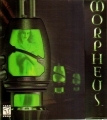Morpheus
First posted on 19 December 2010. Last updated on 19 December 2010.
There are adventure games that you play once and forget soon afterward, and then there are adventure games that you remember long after you finish playing them. These latter games have themes that compel you to contemplate about them, even when you are not playing. You are haunted by these games, and you feel uncomfortable even when you finally finish them. Yet, you feel compelled to play them again just to see if you may have missed. These games are unforgettable. Morpheus is such a game.
Morpheus has a truly unforgettable story. The themes are dark and disturbing. With the exception of a particular character, all the characters in the story are vile and terrible. In the game, you will meet a deformed boy who ultimately takes revenge and kills his tormenters, a harsh woman who abuses the children in her care, a selfish and crude boxer, a narcissistic mother who puts her child into an orphanage because she wants to pursue her acting career, a doctor who is a crazed drug addict, an uncaring and cold feeling millionaire, and a two-bit swindler and con artist, amongst others. The story is intense, with no humor or loving melodrama to redeem itself. Still, the core of humanity portrayed by the story is both skillfully told and compelling to follow.
You play as the game's main protagonist, Matthew Holmes. Matthew is an Arctic explorer obsessed in finding his father who has disappeared back in 1928 in the Arctic. His father is also an explorer who has attempted to cross the Arctic in a hot air balloon expedition. During this ill-fated expedition, Matthew's father meets another explorer, almost frozen but yet still alive near an encampment. He is millionaire J.C. Pharris, who tells Matthew's father about his ship, the Herculania, which is stuck in the ice not far from where they are now. Matthew's father goes alone to find the ship but has never returned. Just as Matt himself is about to freeze to death in his own expedition, separated by his comrades, he stumbles upon the Herculania. He climbs aboard and learns about the ship, its passengers, and what has really happened to his father some 30 years earlier. As you explore the ship, you will discover its passengers and crew are not large in number. Moreover, the passengers all share a common connection and a subsequent unique fate. The Herculania, with technology decades ahead of its time, holds a secret so dark that, when you finally discover what it is, you will wish you have not.
In Morpheus, you interact with the other characters via visions and dreams. Indeed, the most intriguing part of the plotline is the fact that you can travel into other characters' dreams and explore them. Such premise has never been explored to this extent in any other adventure games I have played. Once you are inside a dream, you must then find a way to get out. This is where the majority of the puzzles are found. Within each dream, there are 3 puzzles to solve that get progressively harder. You also need to recover 3 items related to each dream (there are 5 dreams in total). Some of the puzzles can provide quite a challenge, but they are all connected somehow to the cast of eccentric characters and what motivates them in their own ways. The dreams are what makes this story so compelling. The game is named after Morpheus, the Greek god of dreams. Suffice to say that after having played this game for the first time, I have come to understand the true meaning behind the title.
The game's graphics are state of the art for the time of its release. It uses Quicktime VR that enables a true 360 degree panoramic view (both horizontally and vertically). Unlike Myst where you transit between the Ages in a slide show, with Morpheus you move throughout the Herculania in full fluid motion (again via Quicktime VR). At times, you feel like you are walking on the decks of an abandoned ship. The game also incorporates Full Motion Video (FMV) of live actors into many cut scenes that are then rendered together with modeled graphics. Many of the FMV shots are pixelated and have a ghostly appearance (akin to The 7th Guest), undoubtedly reflecting the limitation in video technology of its time. The game disc is a hybrid format for both Windows and Macintosh.
The game's interface is simple and easy to use. Only the mouse is needed for navigation. No keyboard is required (which I find refreshing). The 360 degree panning is not difficult to master, but you can turn too quickly if you are not careful and end up spinning around like a merry-go-round.
The game's background music is very moody and adds much to the overall haunting atmosphere. It is subtle and does not take away your attention to the puzzle you are trying to solve. Sound effects are sparingly used but to good effect.
Morpheus is a game that is also full of surprises. Even though the game has very dark themes, you cannot help but feel compelled to go on. Even the ending of the game is not what I have expected, and I am still haunted by the ending to this date.
Overall, Morpheus is an enticing adventure game. It is intense, yet without the violence and gore that is so prevalent in video games today. If you want to play a game that will haunt your mind, or perhaps your dreams, you must not miss out on Morpheus. So, climb aboard the Herculania and explore the dreams of its ill-faded passengers. Now that I have finished playing the game, I am going to play it again—Morpheus is just that addicting!






